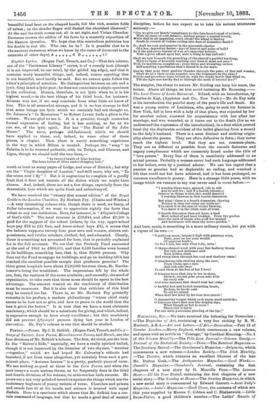We have received the " twenty-first annual edition" of the
Royal Guide to the London Charities. By Herbert Fry. (Chatto and Windas.) —A very interesting volume this, though there is need, we fancy, of fuller information, if we want to appreciate rightly the facts that relate to any one institution. Here, for instance, is " Alleyne's College of God's Gift." The total revenue is £19,644, and after £9,509 is paid for the support of the school (where, by the way, upper-school boys pay £15 to £21 fees, and lower-school boys £5), it seems that the balance supports twenty-four poor men and women, sixteen out- pansioners, and twelve scholars, clothed, fed, and educated. Clearly, there is something not accounted for here, that is probably explained for in the full accounts. We see that the Peabody Fund amounted at the end of 1882 to £804,611, and that 3,533 families were housed in its buildings, something less, that is, than 20,000 persons. Why does not the Fund mortgage its buildings, and go on building till it has reached the smallest possible margin that prudence permits ? The three great hospitals have about £120,000 between them, St. Bartho- lomew's being the wealthiest. The impressions left by the whole are, first, the vastness of the sums available; and secondly, the need of organisation, to take care that these sums should be spent to the best advantage. The amount wasted on the machinery of distribution must be enormous. But it is also clear that criticism of this kind may be carried too far. There is, as Mr. Herbert Fry pointedly remarks in his preface, a modern philanthropy "whose chief study seems to be how not to give, and how to prove to the world that the less it gives the better." It is true that we have a most elaborate machinery, which should be a substitute for giving, and which, indeed, is expensive enough to have every excellence ; but this machinery did not prevent fifty-eight persons dying last year in London of starvation. Mr. Fry's volume is one that should be studied.


































 Previous page
Previous page